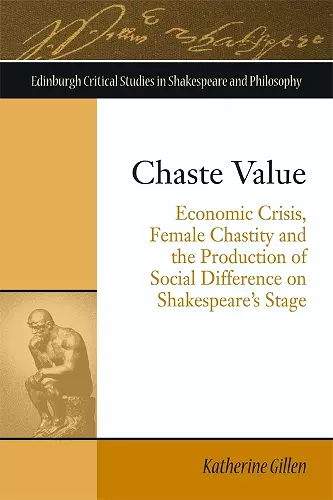Chaste Value
Economic Crisis, Female Chastity and the Production of Social Difference on Shakespeare's Stage
Format:Paperback
Publisher:Edinburgh University Press
Published:26th Feb '19
Currently unavailable, and unfortunately no date known when it will be back

Examines the way that theatrical representations of chastity inform broader concerns about the commoditisation of people in early capitalism Chaste Value reassesses chastity’s significance in early modern drama, arguing that presentations of chastity inform the stage’s production of early capitalist subjectivity and social difference. Plays invoke chastity—itself a quasi-commodity—to interrogate the relationship between personal and economic value. Through chastity discourse, the stage disrupts pre-capitalist ideas of intrinsic value while also reallocating such value according to emerging hierarchies of gender, race, class, and nationality. Chastity, therefore, emerges as a central category within early articulations of humanity, determining who possesses intrinsic value and, conversely, whose bodies and labor can be incorporated into market exchange. Key Features Reevaluates early modern drama’s engagement with female chastity, situating them within broader anxieties about personal commoditization in early capitalist EnglandOffers an update/corrective to new economic critical approaches by demonstrating how concerns about personal and economic value shape emerging hierarchies of race, class, gender, and nationalityUniquely synthesizes current topics of concern in early modern literary studiesOffers innovative readings of seventeen literary works in relation to early modern debates about value, exchange, commoditization, and subjectivity
Gillen’s book digs deeply into the drama of the period, far beyond Shakespeare (despite its title), pursuing a host of problems currently at the forefront of scholarship: the methodology of the 'new economic criticism,' how playwrights thought about the project of the commercial theater itself, and how early capitalism provoked new models of performative subjectivity, among other problems. -- : Henry S. Turner, Recent Studies in Tudor and Stuart Drama * ‘SEL Studies in English Literature 1500-1900,’ Volume 58, Number 2, spring 2018, pp. 473-537 *
This is an important book. Brilliantly conceived and executed, Chaste Value takes seriously its terms of engagement as it brings the economic and ethical value of chastity to the very center of the work (the labor) being carried out on the early modern stage. Whether informed by Thomas Hobbes or Karl Marx, chastity becomes the story around which the theater of Shakespeare and his contemporaries negotiate, often frustratingly, the relationship between symbolic women and real ones, between marriage and prostitution, between black slaves and white wage workers, between homosocial masculinity and same-sex sexual abuse. Gillen’s deeply intersectional study seems almost to intuit the ways the theater functions ideologically as the nexus for a mix of commercialized early modern pressure points—including among them not just such physical sites as houses of prostitution and slave markets but also more epistemological ones such as whiteness and queerness. Gillen doesn’t stage her readings of plays as supporting evidence to score easy theoretical points; rather, she carefully and impressively shows how thoroughly the plays of Shakespeare and his contemporaries themselves engaged in or struggled with chaste thinking. -- Arthur L.Little, Jr., University of California, Los Angeles
ISBN: 9781474444385
Dimensions: unknown
Weight: 490g
320 pages